Civil Law Report: UK Administrative Tribunals and Negligence Cases
VerifiedAdded on 2022/08/09
|7
|1712
|19
Report
AI Summary
This report delves into the realm of civil law, specifically examining the structure and function of administrative tribunals within the UK legal system, alongside an analysis of negligence. The report begins by outlining the characteristics and powers of administrative tribunals, highlighting their role in resolving disputes and their relationship with the court system. It then explores the strengths of these tribunals, such as their informal processes and the provision of legal aid. The second part of the report presents a case study involving issues of negligence and contract law, applying relevant legal principles to determine liability in a scenario involving a car accident and the sale of alcohol to a minor. The analysis considers the elements of negligence, including duty of care, breach, causation, and damages, and the application of the Sale of Goods Act 1893. The conclusion summarizes the findings regarding the liability of the parties involved. The report is a comprehensive analysis of key civil law concepts and their practical application, contributing to a better understanding of the legal system and the resolution of disputes. This report is contributed by a student and is available on Desklib, a platform for AI-based study tools.
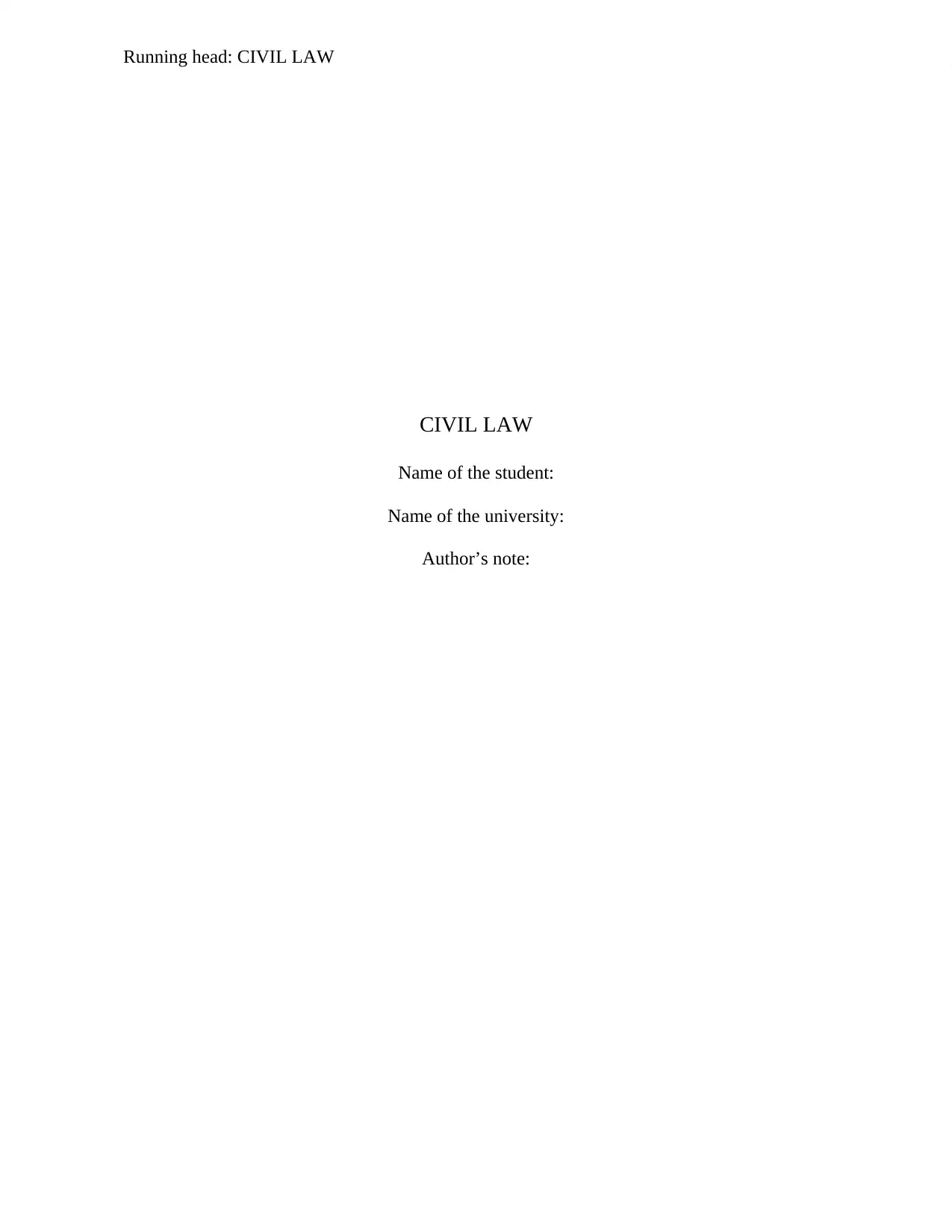
Running head: CIVIL LAW
0
CIVIL LAW
Name of the student:
Name of the university:
Author’s note:
0
CIVIL LAW
Name of the student:
Name of the university:
Author’s note:
Paraphrase This Document
Need a fresh take? Get an instant paraphrase of this document with our AI Paraphraser
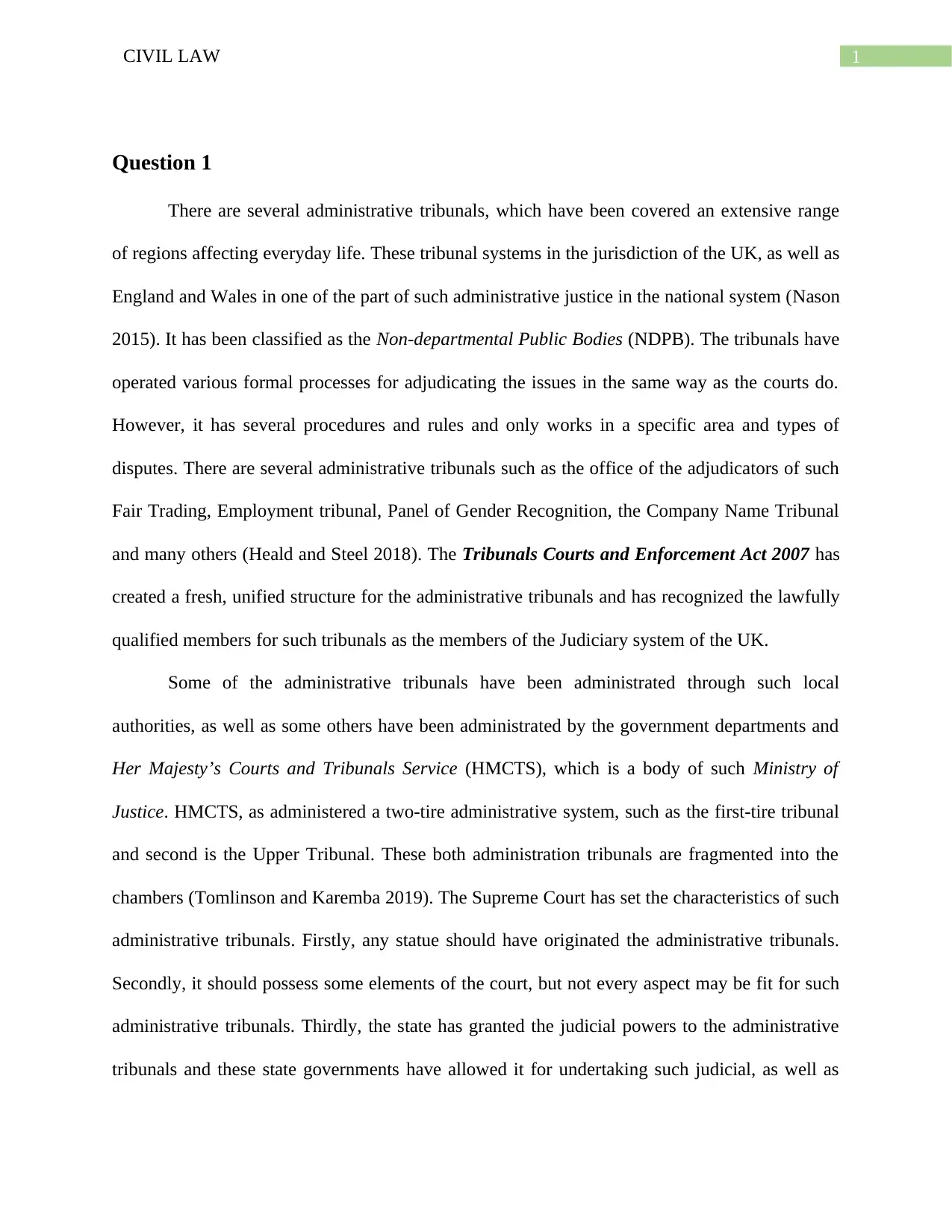
1CIVIL LAW
Question 1
There are several administrative tribunals, which have been covered an extensive range
of regions affecting everyday life. These tribunal systems in the jurisdiction of the UK, as well as
England and Wales in one of the part of such administrative justice in the national system (Nason
2015). It has been classified as the Non-departmental Public Bodies (NDPB). The tribunals have
operated various formal processes for adjudicating the issues in the same way as the courts do.
However, it has several procedures and rules and only works in a specific area and types of
disputes. There are several administrative tribunals such as the office of the adjudicators of such
Fair Trading, Employment tribunal, Panel of Gender Recognition, the Company Name Tribunal
and many others (Heald and Steel 2018). The Tribunals Courts and Enforcement Act 2007 has
created a fresh, unified structure for the administrative tribunals and has recognized the lawfully
qualified members for such tribunals as the members of the Judiciary system of the UK.
Some of the administrative tribunals have been administrated through such local
authorities, as well as some others have been administrated by the government departments and
Her Majesty’s Courts and Tribunals Service (HMCTS), which is a body of such Ministry of
Justice. HMCTS, as administered a two-tire administrative system, such as the first-tire tribunal
and second is the Upper Tribunal. These both administration tribunals are fragmented into the
chambers (Tomlinson and Karemba 2019). The Supreme Court has set the characteristics of such
administrative tribunals. Firstly, any statue should have originated the administrative tribunals.
Secondly, it should possess some elements of the court, but not every aspect may be fit for such
administrative tribunals. Thirdly, the state has granted the judicial powers to the administrative
tribunals and these state governments have allowed it for undertaking such judicial, as well as
Question 1
There are several administrative tribunals, which have been covered an extensive range
of regions affecting everyday life. These tribunal systems in the jurisdiction of the UK, as well as
England and Wales in one of the part of such administrative justice in the national system (Nason
2015). It has been classified as the Non-departmental Public Bodies (NDPB). The tribunals have
operated various formal processes for adjudicating the issues in the same way as the courts do.
However, it has several procedures and rules and only works in a specific area and types of
disputes. There are several administrative tribunals such as the office of the adjudicators of such
Fair Trading, Employment tribunal, Panel of Gender Recognition, the Company Name Tribunal
and many others (Heald and Steel 2018). The Tribunals Courts and Enforcement Act 2007 has
created a fresh, unified structure for the administrative tribunals and has recognized the lawfully
qualified members for such tribunals as the members of the Judiciary system of the UK.
Some of the administrative tribunals have been administrated through such local
authorities, as well as some others have been administrated by the government departments and
Her Majesty’s Courts and Tribunals Service (HMCTS), which is a body of such Ministry of
Justice. HMCTS, as administered a two-tire administrative system, such as the first-tire tribunal
and second is the Upper Tribunal. These both administration tribunals are fragmented into the
chambers (Tomlinson and Karemba 2019). The Supreme Court has set the characteristics of such
administrative tribunals. Firstly, any statue should have originated the administrative tribunals.
Secondly, it should possess some elements of the court, but not every aspect may be fit for such
administrative tribunals. Thirdly, the state has granted the judicial powers to the administrative
tribunals and these state governments have allowed it for undertaking such judicial, as well as
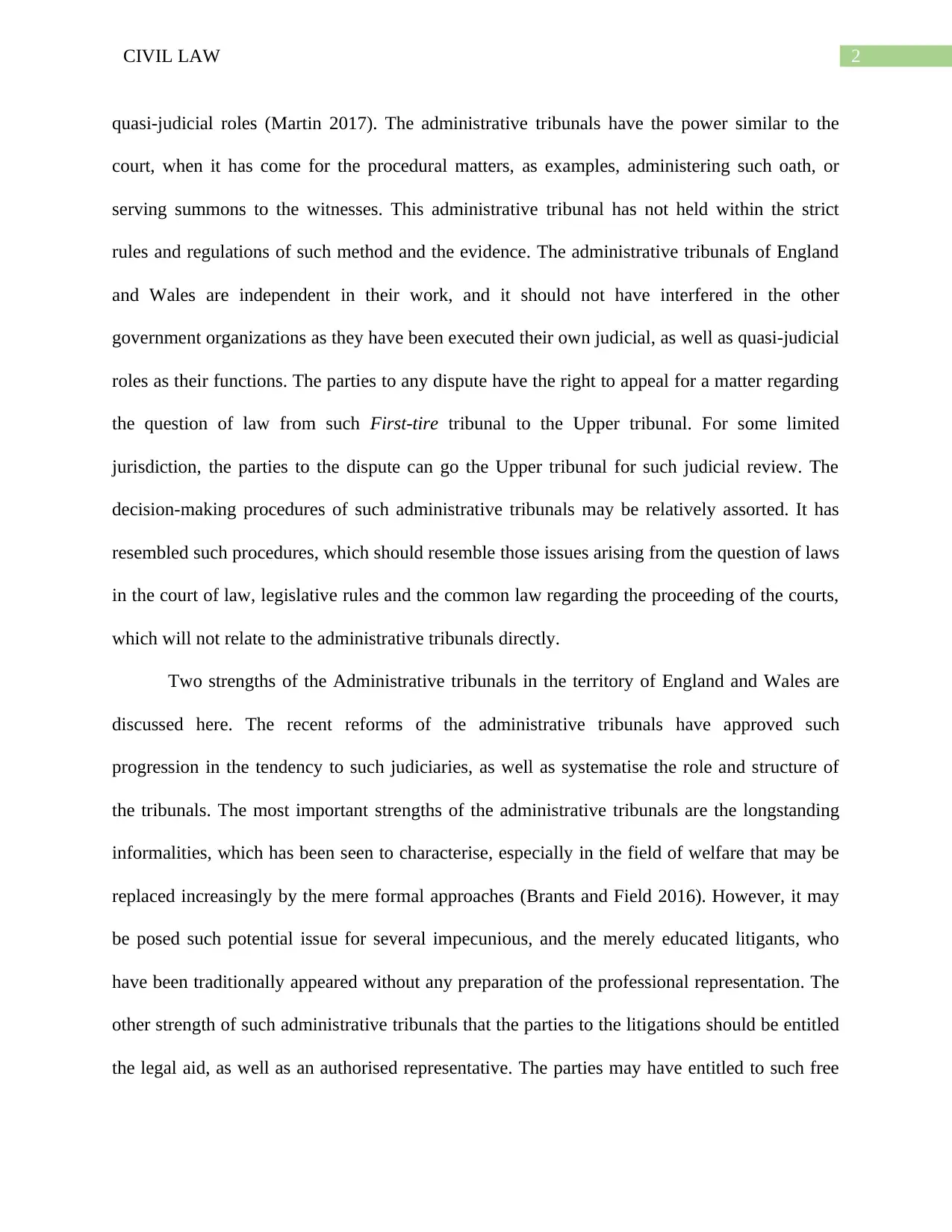
2CIVIL LAW
quasi-judicial roles (Martin 2017). The administrative tribunals have the power similar to the
court, when it has come for the procedural matters, as examples, administering such oath, or
serving summons to the witnesses. This administrative tribunal has not held within the strict
rules and regulations of such method and the evidence. The administrative tribunals of England
and Wales are independent in their work, and it should not have interfered in the other
government organizations as they have been executed their own judicial, as well as quasi-judicial
roles as their functions. The parties to any dispute have the right to appeal for a matter regarding
the question of law from such First-tire tribunal to the Upper tribunal. For some limited
jurisdiction, the parties to the dispute can go the Upper tribunal for such judicial review. The
decision-making procedures of such administrative tribunals may be relatively assorted. It has
resembled such procedures, which should resemble those issues arising from the question of laws
in the court of law, legislative rules and the common law regarding the proceeding of the courts,
which will not relate to the administrative tribunals directly.
Two strengths of the Administrative tribunals in the territory of England and Wales are
discussed here. The recent reforms of the administrative tribunals have approved such
progression in the tendency to such judiciaries, as well as systematise the role and structure of
the tribunals. The most important strengths of the administrative tribunals are the longstanding
informalities, which has been seen to characterise, especially in the field of welfare that may be
replaced increasingly by the mere formal approaches (Brants and Field 2016). However, it may
be posed such potential issue for several impecunious, and the merely educated litigants, who
have been traditionally appeared without any preparation of the professional representation. The
other strength of such administrative tribunals that the parties to the litigations should be entitled
the legal aid, as well as an authorised representative. The parties may have entitled to such free
quasi-judicial roles (Martin 2017). The administrative tribunals have the power similar to the
court, when it has come for the procedural matters, as examples, administering such oath, or
serving summons to the witnesses. This administrative tribunal has not held within the strict
rules and regulations of such method and the evidence. The administrative tribunals of England
and Wales are independent in their work, and it should not have interfered in the other
government organizations as they have been executed their own judicial, as well as quasi-judicial
roles as their functions. The parties to any dispute have the right to appeal for a matter regarding
the question of law from such First-tire tribunal to the Upper tribunal. For some limited
jurisdiction, the parties to the dispute can go the Upper tribunal for such judicial review. The
decision-making procedures of such administrative tribunals may be relatively assorted. It has
resembled such procedures, which should resemble those issues arising from the question of laws
in the court of law, legislative rules and the common law regarding the proceeding of the courts,
which will not relate to the administrative tribunals directly.
Two strengths of the Administrative tribunals in the territory of England and Wales are
discussed here. The recent reforms of the administrative tribunals have approved such
progression in the tendency to such judiciaries, as well as systematise the role and structure of
the tribunals. The most important strengths of the administrative tribunals are the longstanding
informalities, which has been seen to characterise, especially in the field of welfare that may be
replaced increasingly by the mere formal approaches (Brants and Field 2016). However, it may
be posed such potential issue for several impecunious, and the merely educated litigants, who
have been traditionally appeared without any preparation of the professional representation. The
other strength of such administrative tribunals that the parties to the litigations should be entitled
the legal aid, as well as an authorised representative. The parties may have entitled to such free
⊘ This is a preview!⊘
Do you want full access?
Subscribe today to unlock all pages.

Trusted by 1+ million students worldwide
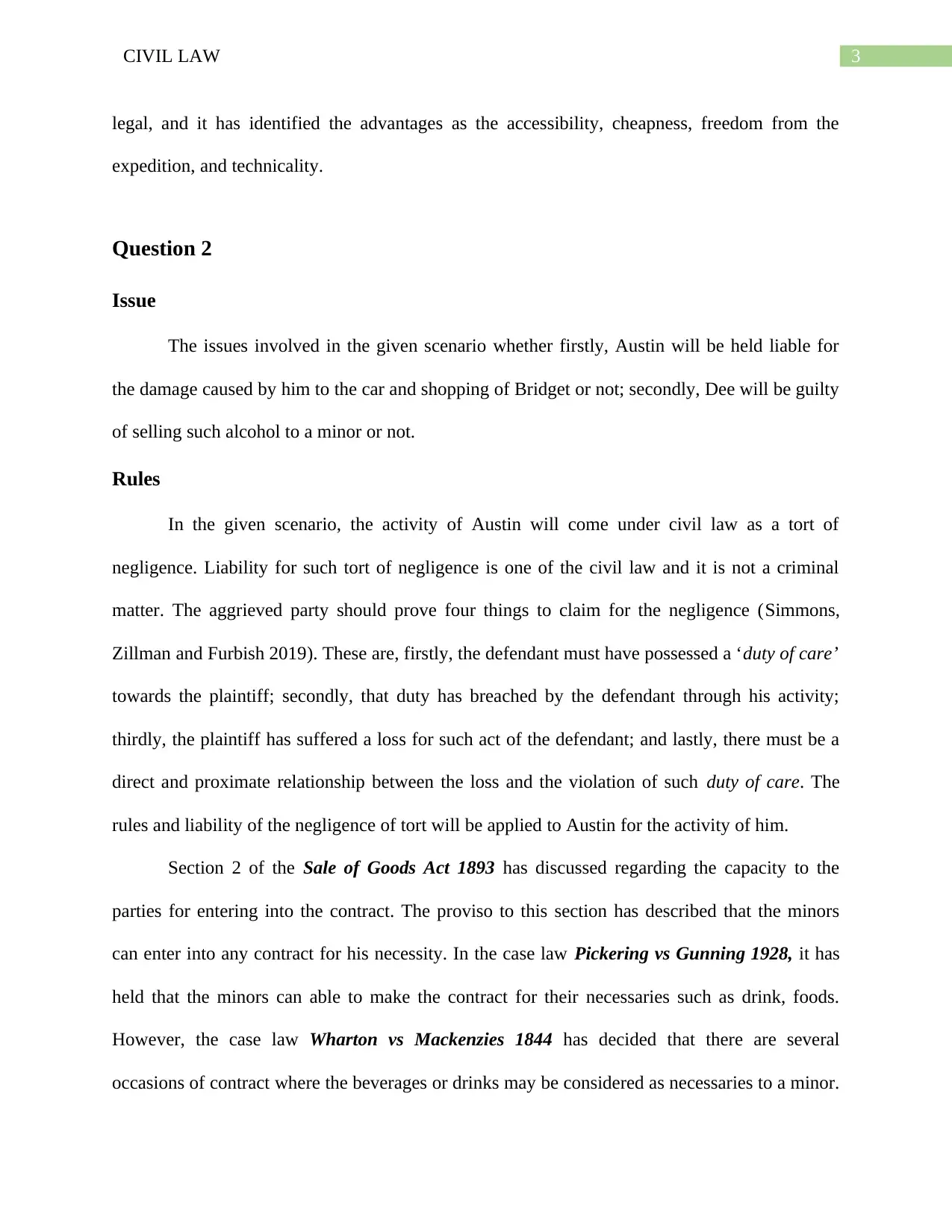
3CIVIL LAW
legal, and it has identified the advantages as the accessibility, cheapness, freedom from the
expedition, and technicality.
Question 2
Issue
The issues involved in the given scenario whether firstly, Austin will be held liable for
the damage caused by him to the car and shopping of Bridget or not; secondly, Dee will be guilty
of selling such alcohol to a minor or not.
Rules
In the given scenario, the activity of Austin will come under civil law as a tort of
negligence. Liability for such tort of negligence is one of the civil law and it is not a criminal
matter. The aggrieved party should prove four things to claim for the negligence (Simmons,
Zillman and Furbish 2019). These are, firstly, the defendant must have possessed a ‘duty of care’
towards the plaintiff; secondly, that duty has breached by the defendant through his activity;
thirdly, the plaintiff has suffered a loss for such act of the defendant; and lastly, there must be a
direct and proximate relationship between the loss and the violation of such duty of care. The
rules and liability of the negligence of tort will be applied to Austin for the activity of him.
Section 2 of the Sale of Goods Act 1893 has discussed regarding the capacity to the
parties for entering into the contract. The proviso to this section has described that the minors
can enter into any contract for his necessity. In the case law Pickering vs Gunning 1928, it has
held that the minors can able to make the contract for their necessaries such as drink, foods.
However, the case law Wharton vs Mackenzies 1844 has decided that there are several
occasions of contract where the beverages or drinks may be considered as necessaries to a minor.
legal, and it has identified the advantages as the accessibility, cheapness, freedom from the
expedition, and technicality.
Question 2
Issue
The issues involved in the given scenario whether firstly, Austin will be held liable for
the damage caused by him to the car and shopping of Bridget or not; secondly, Dee will be guilty
of selling such alcohol to a minor or not.
Rules
In the given scenario, the activity of Austin will come under civil law as a tort of
negligence. Liability for such tort of negligence is one of the civil law and it is not a criminal
matter. The aggrieved party should prove four things to claim for the negligence (Simmons,
Zillman and Furbish 2019). These are, firstly, the defendant must have possessed a ‘duty of care’
towards the plaintiff; secondly, that duty has breached by the defendant through his activity;
thirdly, the plaintiff has suffered a loss for such act of the defendant; and lastly, there must be a
direct and proximate relationship between the loss and the violation of such duty of care. The
rules and liability of the negligence of tort will be applied to Austin for the activity of him.
Section 2 of the Sale of Goods Act 1893 has discussed regarding the capacity to the
parties for entering into the contract. The proviso to this section has described that the minors
can enter into any contract for his necessity. In the case law Pickering vs Gunning 1928, it has
held that the minors can able to make the contract for their necessaries such as drink, foods.
However, the case law Wharton vs Mackenzies 1844 has decided that there are several
occasions of contract where the beverages or drinks may be considered as necessaries to a minor.
Paraphrase This Document
Need a fresh take? Get an instant paraphrase of this document with our AI Paraphraser
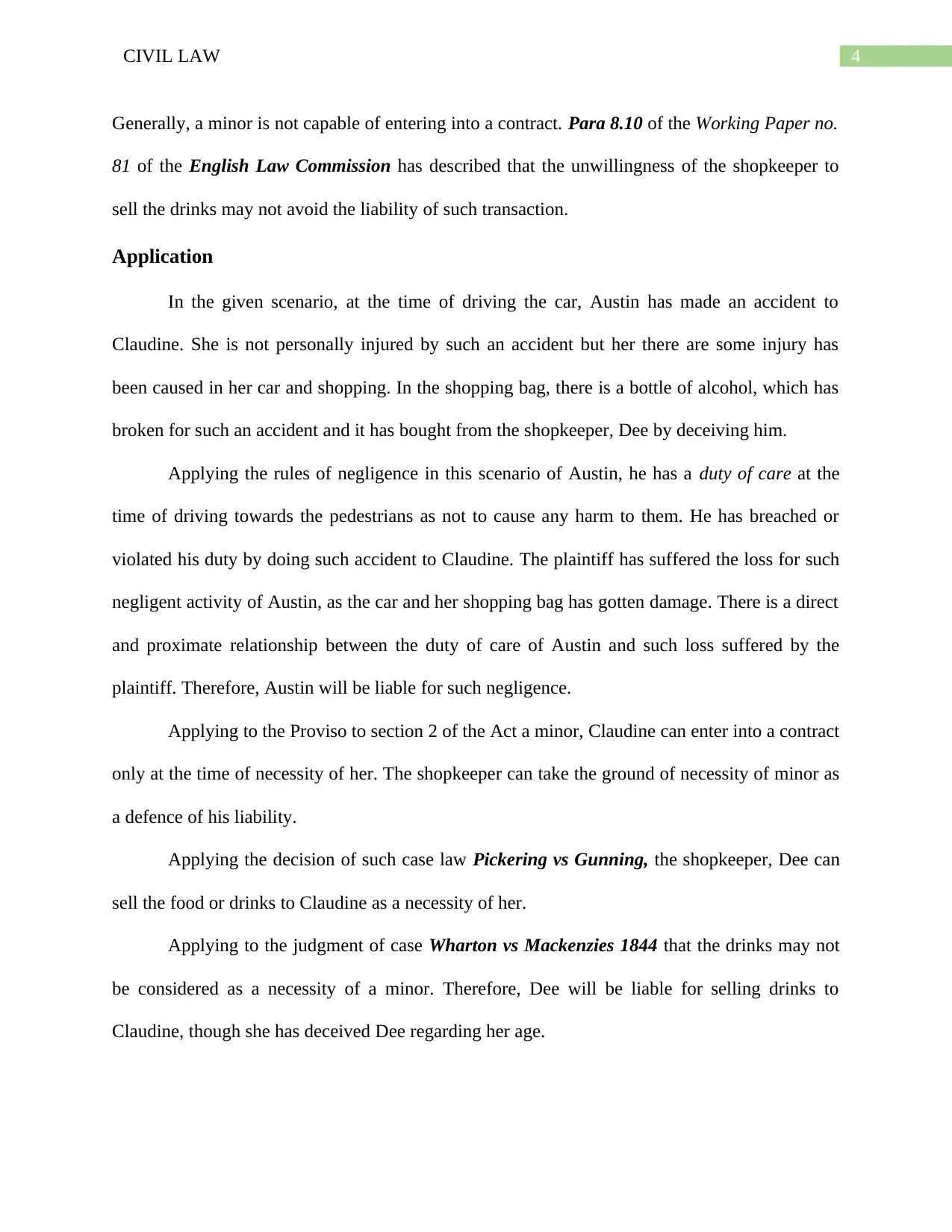
4CIVIL LAW
Generally, a minor is not capable of entering into a contract. Para 8.10 of the Working Paper no.
81 of the English Law Commission has described that the unwillingness of the shopkeeper to
sell the drinks may not avoid the liability of such transaction.
Application
In the given scenario, at the time of driving the car, Austin has made an accident to
Claudine. She is not personally injured by such an accident but her there are some injury has
been caused in her car and shopping. In the shopping bag, there is a bottle of alcohol, which has
broken for such an accident and it has bought from the shopkeeper, Dee by deceiving him.
Applying the rules of negligence in this scenario of Austin, he has a duty of care at the
time of driving towards the pedestrians as not to cause any harm to them. He has breached or
violated his duty by doing such accident to Claudine. The plaintiff has suffered the loss for such
negligent activity of Austin, as the car and her shopping bag has gotten damage. There is a direct
and proximate relationship between the duty of care of Austin and such loss suffered by the
plaintiff. Therefore, Austin will be liable for such negligence.
Applying to the Proviso to section 2 of the Act a minor, Claudine can enter into a contract
only at the time of necessity of her. The shopkeeper can take the ground of necessity of minor as
a defence of his liability.
Applying the decision of such case law Pickering vs Gunning, the shopkeeper, Dee can
sell the food or drinks to Claudine as a necessity of her.
Applying to the judgment of case Wharton vs Mackenzies 1844 that the drinks may not
be considered as a necessity of a minor. Therefore, Dee will be liable for selling drinks to
Claudine, though she has deceived Dee regarding her age.
Generally, a minor is not capable of entering into a contract. Para 8.10 of the Working Paper no.
81 of the English Law Commission has described that the unwillingness of the shopkeeper to
sell the drinks may not avoid the liability of such transaction.
Application
In the given scenario, at the time of driving the car, Austin has made an accident to
Claudine. She is not personally injured by such an accident but her there are some injury has
been caused in her car and shopping. In the shopping bag, there is a bottle of alcohol, which has
broken for such an accident and it has bought from the shopkeeper, Dee by deceiving him.
Applying the rules of negligence in this scenario of Austin, he has a duty of care at the
time of driving towards the pedestrians as not to cause any harm to them. He has breached or
violated his duty by doing such accident to Claudine. The plaintiff has suffered the loss for such
negligent activity of Austin, as the car and her shopping bag has gotten damage. There is a direct
and proximate relationship between the duty of care of Austin and such loss suffered by the
plaintiff. Therefore, Austin will be liable for such negligence.
Applying to the Proviso to section 2 of the Act a minor, Claudine can enter into a contract
only at the time of necessity of her. The shopkeeper can take the ground of necessity of minor as
a defence of his liability.
Applying the decision of such case law Pickering vs Gunning, the shopkeeper, Dee can
sell the food or drinks to Claudine as a necessity of her.
Applying to the judgment of case Wharton vs Mackenzies 1844 that the drinks may not
be considered as a necessity of a minor. Therefore, Dee will be liable for selling drinks to
Claudine, though she has deceived Dee regarding her age.

5CIVIL LAW
Conclusion
Therefore, it may be concluded in this scenario that Austin will be held responsible or
liable for his negligence and made an accident to the pedestrian, Claudine. Bee, the shopkeeper
will also be responsible or guilty for selling such alcohol to s minor, Claudine.
Conclusion
Therefore, it may be concluded in this scenario that Austin will be held responsible or
liable for his negligence and made an accident to the pedestrian, Claudine. Bee, the shopkeeper
will also be responsible or guilty for selling such alcohol to s minor, Claudine.
⊘ This is a preview!⊘
Do you want full access?
Subscribe today to unlock all pages.

Trusted by 1+ million students worldwide
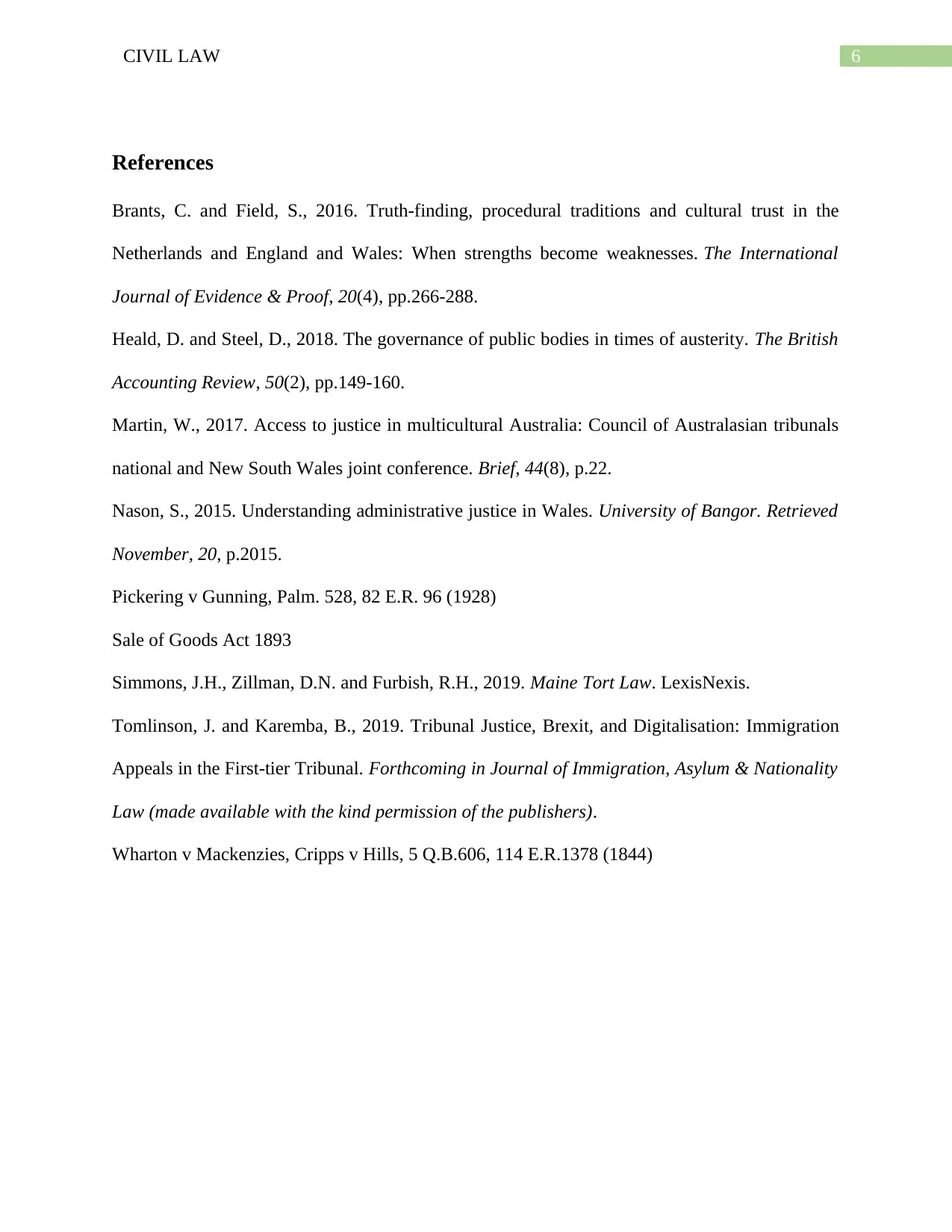
6CIVIL LAW
References
Brants, C. and Field, S., 2016. Truth-finding, procedural traditions and cultural trust in the
Netherlands and England and Wales: When strengths become weaknesses. The International
Journal of Evidence & Proof, 20(4), pp.266-288.
Heald, D. and Steel, D., 2018. The governance of public bodies in times of austerity. The British
Accounting Review, 50(2), pp.149-160.
Martin, W., 2017. Access to justice in multicultural Australia: Council of Australasian tribunals
national and New South Wales joint conference. Brief, 44(8), p.22.
Nason, S., 2015. Understanding administrative justice in Wales. University of Bangor. Retrieved
November, 20, p.2015.
Pickering v Gunning, Palm. 528, 82 E.R. 96 (1928)
Sale of Goods Act 1893
Simmons, J.H., Zillman, D.N. and Furbish, R.H., 2019. Maine Tort Law. LexisNexis.
Tomlinson, J. and Karemba, B., 2019. Tribunal Justice, Brexit, and Digitalisation: Immigration
Appeals in the First-tier Tribunal. Forthcoming in Journal of Immigration, Asylum & Nationality
Law (made available with the kind permission of the publishers).
Wharton v Mackenzies, Cripps v Hills, 5 Q.B.606, 114 E.R.1378 (1844)
References
Brants, C. and Field, S., 2016. Truth-finding, procedural traditions and cultural trust in the
Netherlands and England and Wales: When strengths become weaknesses. The International
Journal of Evidence & Proof, 20(4), pp.266-288.
Heald, D. and Steel, D., 2018. The governance of public bodies in times of austerity. The British
Accounting Review, 50(2), pp.149-160.
Martin, W., 2017. Access to justice in multicultural Australia: Council of Australasian tribunals
national and New South Wales joint conference. Brief, 44(8), p.22.
Nason, S., 2015. Understanding administrative justice in Wales. University of Bangor. Retrieved
November, 20, p.2015.
Pickering v Gunning, Palm. 528, 82 E.R. 96 (1928)
Sale of Goods Act 1893
Simmons, J.H., Zillman, D.N. and Furbish, R.H., 2019. Maine Tort Law. LexisNexis.
Tomlinson, J. and Karemba, B., 2019. Tribunal Justice, Brexit, and Digitalisation: Immigration
Appeals in the First-tier Tribunal. Forthcoming in Journal of Immigration, Asylum & Nationality
Law (made available with the kind permission of the publishers).
Wharton v Mackenzies, Cripps v Hills, 5 Q.B.606, 114 E.R.1378 (1844)
1 out of 7
Related Documents
Your All-in-One AI-Powered Toolkit for Academic Success.
+13062052269
info@desklib.com
Available 24*7 on WhatsApp / Email
![[object Object]](/_next/static/media/star-bottom.7253800d.svg)
Unlock your academic potential
Copyright © 2020–2026 A2Z Services. All Rights Reserved. Developed and managed by ZUCOL.




